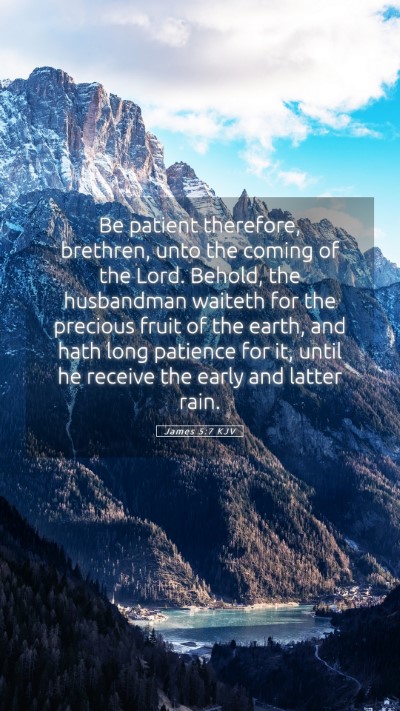Old Testament
Genesis Exodus Leviticus Numbers Deuteronomy Joshua Judges Ruth 1 Samuel 2 Samuel 1 Kings 2 Kings 1 Chronicles 2 Chronicles Ezra Nehemiah Esther Job Psalms Proverbs Ecclesiastes Song of Solomon Isaiah Jeremiah Lamentations Ezekiel Daniel Hosea Joel Amos Obadiah Jonah Micah Nahum Habakkuk Zephaniah Haggai Zechariah MalachiJames 5:7 Meaning
What is the meaning of James 5:7?
Be patient therefore, brethren, unto the coming of the Lord. Behold, the husbandman waiteth for the precious fruit of the earth, and hath long patience for it, until he receive the early and latter rain.
James 5:7 Bible Verse Meaning
Understanding James 5:7: A Comprehensive Commentary
James 5:7 states: "Be patient therefore, brethren, unto the coming of the Lord. Behold, the husbandman waiteth for the precious fruit of the earth, and hath long patience for it, until he receives the early and latter rain."
This verse presents a profound call to patience, especially in the context of suffering and waiting for the Lord's return. It is essential to approach this verse with an understanding of its implications, which have been elaborated on by various public domain commentaries.
Summary of Insights from Commentaries
-
Matthew Henry's Commentary emphasizes the importance of patience among believers, particularly in the face of trials. He highlights that just as a farmer waits for the harvest, Christians should endure tribulations with a hopeful expectation of Christ's return.
-
Albert Barnes comments on the agricultural metaphor used by James. He points out that the 'husbandman' (farmer) represents the hard-working Christian who remains steadfast. The references to 'early and latter rain' suggest the dependence on God’s providence for spiritual growth and nourishment.
-
Adam Clarke offers a deeper analysis of the concept of patience, connecting it with spiritual maturity. He notes that patience is not passive but involves active waiting, contributing to one's character and faith.
Detailed Analysis
In exploring the meaning of James 5:7, we see that it urges believers to adopt an attitude of perseverance. This call to patience is not just a passive waiting but an engaged expectancy for the Lord's coming, analogous to the farmer's toil and patience in awaiting the fruits of his labor.
The Metaphor of the Husbandman
The reference to the 'husbandman' serves several purposes:
- Symbol of Hard Work: It illustrates the diligence required in the Christian walk, where growth and fruitfulness take time and labor.
- Expectation of Fruit: Just as the farmer waits for a bountiful harvest, Christians are assured that their patience will bear fruit in the form of spiritual blessings.
- The Role of Patience: Highlighting the necessity of both 'early' and 'latter rain' signifies the realistic acknowledgment of seasons in life, reinforcing the need for patience during spiritual droughts.
Applications for Today
Understanding this scripture in a contemporary context encourages Christians to:
- Remain Faithful in Trials: As challenges arise, believers are reminded to keep faith and trust in God's timing.
- Engage in Active Waiting: Instead of idleness, waiting on the Lord calls for engagement in faith practices, such as prayer and service to others.
- Encourage One Another: In Bible study groups, discussions about this verse can foster a community of support, reminding each other of the hope we hold.
Related Biblical Cross References
- Romans 8:25 - "But if we hope for what we do not see, we wait for it with patience."
- Galatians 6:9 - "And let us not be weary in well-doing: for in due season we shall reap, if we faint not."
- Hebrews 10:36 - "For ye have need of patience, that, after ye have done the will of God, ye might receive the promise."
Conclusion
In conclusion, James 5:7 serves as a poignant reminder of the virtue of patience in the believer’s life. By combining insights from various reputable public domain commentaries, this analysis not only sheds light on the original intent of the scripture but also fosters a deeper understanding of its applications in today’s world.
As you reflect on this verse in your personal study or in Bible study groups, consider the profound implications of waiting with hope and faith for the coming of the Lord.


